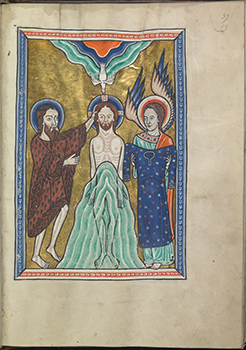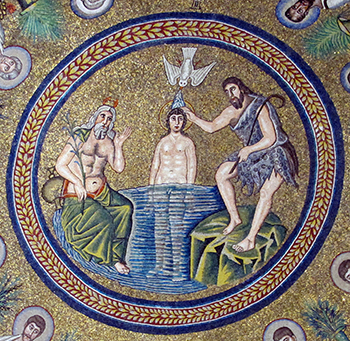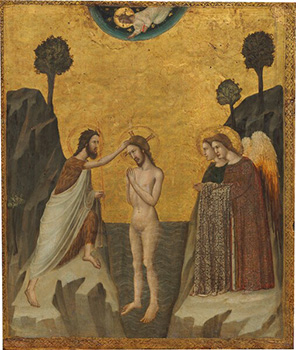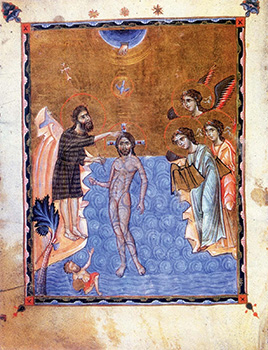From Our Archives
Debie Thomas, Thin Place, Deep Water (2016); Debie Thomas, Choosing Epiphany (2019); and Debie Thomas, One of Us (2022).
This Week's Essay
Isaiah 43:1, "I have called you by name; you are mine!"
For Sunday January 12, 2025
Lectionary Readings (Revised Common Lectionary, Year C)
Psalm 29
Acts 8:14-17
Luke 3:15-22
When Lindsey Crittenden was a little girl, she was practicing that magical trick that is the stuff of childhood — floating on your back in the swimming pool. When you flap and flail, explained her coach Mrs. Ursula, you will sink, but if you just relax, "the water will hold you." Mrs. Ursula's calm and confident encouragement stuck, and became the title for Crittenden's memoir: The Water Will Hold You; A Skeptic Learns to Pray (2007).
The water will hold you. That's a powerful summary of the reading for this week about the baptism of Jesus, and, by extension, our own baptisms. In the waters of baptism we hear the promises of God from Isaiah 43: "You are my beloved. Do not fear. I have called you by name. You are mine. You are precious in my sight, and I love you. I am with you."
After living in total obscurity his entire life, in his late twenties Jesus left his family in Nazareth and burst onto the public scene by joining the movement of his eccentric cousin John. Some scholars have suggested that Jesus submitted himself to John as a disciple to a mentor, and that perhaps John was part of the apocalyptic Jewish sect of Essenes who opposed the temple in Jerusalem. By any measure, John the Baptizer was a prophet of radical dissent; his detractors said he had a demon.
Whereas John's father Zechariah was a priest in the Jerusalem temple — the epitome and epicenter of the religious establishment, John fled the comforts and corruptions of the city for the loneliness of the desert, where he dressed in animal skins and ate insects and wild honey. Living on the margins of society, both literally and figuratively, he preached a baptism of repentance for the forgiveness of sins. Marcus Borg described this as a message of indictment and invitation: "Repent, for the kingdom of heaven is at hand!" Later, Jesus used these exact words to announce his own public ministry.
 |
|
Miniature from the Psalter of Eleanor of Aquitaine (c. 1185).
|
Contrary to what we might have expected from such an ascetic man with a stern message, the gospels say that crowds of people flocked to John at the Jordan River. Even in far away Ephesus—600 miles from Jerusalem, people submitted to the baptism of John (Acts 19:3).
John's preaching in the Judean desert and baptizing in the Jordan River confounded both the religious and political powers of his day. Instead of cooperation, accommodation, or resignation, John challenged the religious and political status quo with his anti-establishment message of protest and renewal. By joining the Baptizer's fringe movement, Jesus did likewise. The prophetic word of God from John didn't originate with the state powers or the religious establishment, nor did it find a receptive audience with them.
John castigated the religious authorities as a "brood of vipers" (in one translation, "snake bastards") for their hypocrisy, and for how they claimed a gate-keeper monopoly on mediating God's forgiveness to people. The religious experts, said Jesus, spurned John's call to baptismal repentance, and in so doing "rejected God's purpose for themselves" (Luke 7:30).
As for imperial Rome, about six months after John emerged from the desert like some scraggly lunatic and baptized Jesus, he was murdered at the whim of Herod the tetrarch, who at a dinner party capitulated to the sadistic demand of his girlfriend's daughter. John was the forerunner of Jesus, but he was also a forth-teller to Herod, having rebuked Herod for sleeping with his brother's wife. But as with many perverse politicians, Herod had his way with him who had spoken truth to power.
 |
|
Arian Baptistry, Ravenna, 6th-century mosaic.
|
With some important stylistic differences, all four Gospels tell the story of Jesus's baptism by John: "When all the people were being baptized, Jesus was baptized too. And as he was praying, heaven was opened and the Holy Spirit descended on him in bodily form like a dove. And a voice came from heaven: 'You are my Son, whom I love; with you I am well pleased.'"
After his own radical rupture with his family and conventional society by identifying with the desert troublemaker, Jesus's family tried to apprehend him. His hometown village of Nazareth tried to kill him as a deranged crackpot (cf. Mark 3:21, Luke 4:29, John 7:5).
Why did Jesus the greater submit to baptism by John the lesser? Did he need to repent of his own sins? The earliest witnesses of his baptism asked this question, because in Matthew's Gospel John the Baptizer tried to deter Jesus: "Why do you come to me? I need to be baptized by you!" John insinuates that Jesus was not getting baptized for his own sins.
But even a hundred years after the event, Jesus's baptism made some Christians feel uneasy. In the non-canonical Gospel of the Hebrews (c. 80–150 AD), Jesus denies that he needs to repent. He seems to get baptized to please his mother: "The mother of the Lord and his brothers said to him, 'John the Baptist baptizes for the forgiveness of sins; let us go and be baptized by him.' But he said to them, 'In what way have I sinned that I should go and be baptized by him? Unless, perhaps, what I have just said is a sin of ignorance.'” Others have suggested that Jesus set an example for us, that just as he was baptized, we too should be baptized.
 |
|
Giovanni Baronzio, Baptism of Christ, tempera on panel, 14th century.
|
Jesus's baptism inaugurated his public ministry by identifying with what Mark describes as "the whole Judean countryside and all the people of Jerusalem." He allied himself with the faults and failures, the pains and the problems, and with all the broken and hurting people who had flocked to the Jordan River. By wading into the waters with them he took his place beside us and among us. Not long into his public mission, the sanctimonious religious leaders derided Jesus as a "friend of gluttons and sinners." They were right about that.
With his baptism, Jesus openly and decisively stood shoulder to shoulder with us in our fears and anxieties. He intentionally took sides with people in their neediness, and declared that God was biased in their favor: "For we do not have a high priest who is unable to sympathize with our weaknesses, but we have one who has been tempted in every way, just as we are — yet was without sin. Let us then approach the throne of grace with confidence, so that we may receive mercy and find grace to help in our time of need.” (Hebrews 4:15–16, NIV). God's abundant mercy, Jesus declared, is available freely and fully to every person; it's not the private preserve doled out by the temple establishment in Jerusalem.
Jesus's baptismal solidarity with broken people was vividly confirmed by divine affirmation and empowerment. Still wet with water after his cousin had plunged him beneath the Jordan River, Jesus heard a voice and saw a vision — the declaration of God the Father that Jesus was his beloved son, and the descent of God the Spirit in the form of a dove. The vision and the voice punctuated the baptismal event. They signaled the meaning, the message and the mission of Jesus as he went public after thirty years of invisibility — that by the power of the Spirit, he embodied his Father's unconditional love for all people everywhere.
In his own baptism, Jesus received a new name — he was beloved by God. Writing in the Huffington Post about the baptism of Jesus, Vicki Flippin of Yale Divinity School says, "I tell folks that baptism is the church declaring what has always been true, that each of us belongs to God and only to God. The child is claimed by God above all other claims."
 |
|
Baptism of Jesus, Armenian illuminated manuscript, 1268.
|
Many malignant forces try to name and claim us. Baptism reminds us that first and foremost, above and beyond all other claims — however legitimate or oppressive — we belong to God. He knows and calls us by name.
We don't belong to our boss or the bank. We don't belong to an abusive spouse or our addictive impulses. We're not defined by sickness, success or failure. We don't belong to the political propagandists or the advertising industry. We're not the sum total of our poor choices, painful memories, or bad dreams.
"Even though it might feel like, look like, smell like, hurt like you belong to all these other things," says Flippin, "as sure as water is wet and God is good, I heard a voice out of the heavens say it: 'You belong to God.' Our baptism can remind us that no one determines our worth in this world or in the next other than God."
Truly, "you are my beloved." The water will hold you.
Weekly Prayer
Hildegard of Bingen (1098–1179)
O comforting fire of Spirit,
Life, within the very Life of all Creation.
Holy you are in giving life to All.Holy you are in anointing
those who are not whole;
Holy you are in cleansing
a festering wound.O sacred breath,
O fire of love,
O sweetest taste in my breast
which fills my heart
with a fine aroma of virtues.O most pure fountain
through whom it is known
that God has united strangers
and inquired after the lost.O breastplate of life
and hope of uniting
all members as One,
O sword-belt of honor,
enfold those who offer blessing.Care for those
who are imprisoned by the enemy
and dissolve the bonds of those
whom Divinity wishes to save.O mightiest path which penetrates All,
from the height to every Earthly abyss,
you compose All, you unite All.Through you clouds stream, ether flies,
stones gain moisture,
waters become streams,
and the earth exudes Life.You always draw out knowledge,
bringing joy through Wisdom's inspiration.Therefore, praise be to you
who are the sound of praise
and the greatest prize of Life,
who are hope and richest honor
bequeathing the reward of Light.Hildegard of Bingen (1098–1179) founded two convents, conducted four preaching tours, penned at least 400 letters, wrote music and a morality play, supervised illuminated manuscripts, cared for her fellow sisters, and wrote three major theological tomes based upon her famous visions. All this despite her pronounced feelings of self-doubt, the lack of formal schooling, chronic illnesses that probably included depression and migraine headaches, and the subservient roles assigned to women by a male-dominated church and culture.
Dan Clendenin: dan@journeywithjesus.net
Image credits: (1) Wikimedia.org; (2) Wikimedia.org; (3) National Gallery of Art;and (4) Britannica.com.





